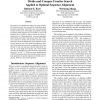Free Online Productivity Tools
i2Speak
i2Symbol
i2OCR
iTex2Img
iWeb2Print
iWeb2Shot
i2Type
iPdf2Split
iPdf2Merge
i2Bopomofo
i2Arabic
i2Style
i2Image
i2PDF
iLatex2Rtf
Sci2ools
105
click to vote
AAAI
2000
2000
Divide-and-Conquer Frontier Search Applied to Optimal Sequence Alignment
We present a new algorithm that reduces the space complexity of heuristic search. It is most effective for problem spaces that grow polynomially with problem size, but contain large numbers of short cycles. For example, the problem of finding an optimal global alignment of several DNA or amino-acid sequences can be solved by finding a lowest-cost corner-tocorner path in a -dimensional grid. A previous algorithm, called divide-and-conquer bidirectional search (Korf 1999), saves memory by storing only the Open lists and not the Closed lists. We show that this idea can be applied in a unidirectional search as well. This extends the technique to problems where bidirectional search is not applicable, and is more efficient in both time and space than the bidirectional version. If
AAAI 2000 | Bidirectional Search | Divide-and-conquer Bidirectional Search | Intelligent Agents | Optimal Global Alignment |
Related Content
| Added | 01 Nov 2010 |
| Updated | 01 Nov 2010 |
| Type | Conference |
| Year | 2000 |
| Where | AAAI |
| Authors | Richard E. Korf, Weixiong Zhang |
Comments (0)

